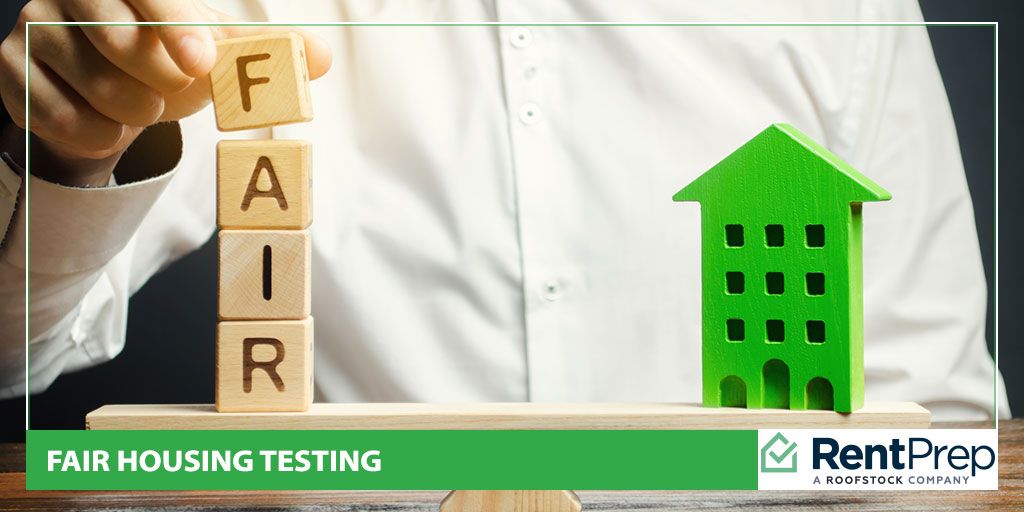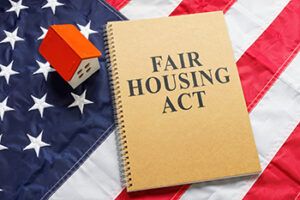
As a landlord, have you ever received a Fair Housing complaint or been contacted by a Fair Housing tester? If so, you know the anxiety and confusion that can cause. And if this is the first time this has happened, you may also be wondering what Fair Housing testing is and how it can affect you.
If a tenant or applicant feels they have been discriminated against, either by you or someone who represents you as a landlord, they may make a complaint under the Fair Housing Act. There were more than 30,000 complaints in 2021 that triggered Fair Housing testing.
The Fair Housing Act prohibits landlords from discriminating against tenants on the basis of any of the protected classes, such as race, religion, or disability. When a complaint is made, Fair Housing testing is used to determine whether there is a pattern of illegal behavior. Prosecution can result in both civil penalties and victim compensation.
Mistakes and misunderstandings happen a lot. For example, steering a disabled person toward more “accessible” properties is considered discrimination, even if you were trying to be helpful.
Did you have a conversation with a potential tenant about their family? They may later assume they were denied a rental because of something they said, even if your intentions were not to use the information to approve or deny a rental.
Today, we’ll cover the main points of the Fair Housing Act, how Fair Housing testing is conducted, and how complaints are pursued. We’ll also share common pitfalls that can trigger complaints and how to prepare for Fair Housing testing.
Fair Housing Testing Table Of Contents
Fair housing testing is a little like “mystery shopper” testing in retail. It can happen at any time and you never know if someone is a tester. That means that the best way to be prepared is to always give everyone the same excellent service and abide by the requirements of the Fair Housing Act. These topics will be covered below:
- What Is The Fair Housing Act?
- Penalties For Breaking The Fair Housing Act
- Fair Housing Testing
- How Are Fair Housing Cases Pursued?
- How To Prepare For Fair Housing Testing
- FAQs – Fair Housing Testing
- Prepare To Be Fair
What Is The Fair Housing Act?

The Fair Housing Act is overseen by the Housing and Civil Enforcement Section of the Civil Rights Division of the Department of Justice (DOJ). It prohibits landlords from discriminating against tenants on the basis of any of the protected characteristics, including race, color, religion, national origin, sex (including sexual orientation and gender identity), disability, and familial status.
Both the DOJ and the Department of Housing and Urban Development (HUD) will investigate and prosecute cases of housing discrimination. As part of their investigations, they work with fair housing testers, who are usually members of local communities who’ve been trained to complete these tests.
Testers usually work on a volunteer basis or are paid per test. They may be directly enlisted by the DOJ or HUD, but more often, they work with local third-party private Fair Housing advocacy organizations.
You can see the Fair Housing Justice Center tester recruitment age here as an example.
There are rental properties to which the Fair Housing Act does not apply. These include:
- Some single-family homes – when the owner has fewer than three homes and the unit is rented without a broker
- Owner-occupied buildings – complexes of two to four units where the owner lives in one
- Religious organizations – may legally give preference to people of their religion when renting non-commercial property, but cannot discriminate against people based on their race, color, or national origin
- Senior housing – that is restricted for certain age brackets
Read our guide to Fair Housing Laws as they apply specifically to apartments.
Penalties For Breaking The Fair Housing Act
Penalties for breaking the Fair Housing Act depend on the nature of the infraction, whether it’s a one-off situation or a pattern of behavior, and where the case is heard.
For example, for cases heard by HUD, the penalty for first infractions is up to $16,000, while the penalty for third infractions can be as much as $65,000.
The Department of Justice deals with bigger cases, and penalties for first offense cases can be up to $150,000. In addition to this, for Department of Justice cases, victim costs may also be awarded in relation to costs incurred because they were unable to secure housing.
According to Department of Justice statistics, since 1992, they have resolved 111 cases through Fair Housing testing, which has resulted in $15.3 million being recovered including $2.3 million in civil penalties and over $13 million in other damages.
What these figures make clear is that while government penalties can be costly, it is often the victim costs that cripple landlords following a case. You can see examples of the cases that have been prosecuted by the DOJ here.
Fair Housing Testing
Most Fair Housing testing is coordinated by private advocacy groups that are active in local communities. An individual will come to them after they feel like they have been discriminated against while seeking rental housing, and they will organize testers to gather evidence to support that claim. That evidence is then submitted to the DOJ or HUD to open an official investigation.
DOJ and HUD investigators are more likely to be sent out on a preventative basis, for example to investigate new housing estates. They will also be used in high-profile cases where a pattern of discrimination is evident.
In either case, they’ll send in testers to pretend to be interested in a property and then report on their experience. They may start with phone calls, organize viewings, or drop into the real estate office for information.
They will often use testers who are very similar in terms of things such as income and familial status to the person who made the complaint, but without the protected characteristics. For example, they may be white rather than Hispanic. They will also send testers with the same protected characteristics to see if they receive similar treatment.
The most common issues found are agents misleading individuals about the availability of properties, or offering different terms and conditions to certain people, apparently based on their protected characteristics.
But problems can also occur when landlords deny access to service animals or recommend alternative properties to individuals with a disability, as this is considered discriminatory “steering.”
There is no way to be sure whether you’re dealing with a genuine house hunter or a tester. Testers may also falsify their application in order to be more comparable with the person who made the initial complaint. While lying on housing applications is illegal, it is deemed acceptable as part of the Fair housing testing process.
How Are Fair Housing Cases Pursued?

If a fair housing advocacy organization believes they have found evidence of a violation of the Fair Housing Act, they will report it to HUD or the DOJ.
Laws are relatively strict about what needs to be turned over to the HUD by the organization that did the testing, to try and ensure fairness and consistency. They must turn over detailed descriptions of what transpired during any tests related to the property that include an accurate property name, address, and test date and time, the name of the agent they contacted, and a description of the characteristics of the tester. They must turn over all tests relating to the property to limit the likelihood that only tests that reinforce charges of discrimination are submitted.
The details of the tester are not submitted, as this information is kept confidential so they can work again. However, they may be interviewed by HUD or DOJ as an anonymous witness during the course of the investigation. Their name is only revealed if a case is subsequently prosecuted.
The complainant has up to one year from the time of an incident to file a complaint. The HUD then has 30 days to complete an initial investigation, and they can choose to accept to dismiss the case.
If the case is accepted, they will initially try to reach a conciliation between the complainant and the respondent, the landlord. If this is unsuccessful and they believe the case is worth pursuing, they will issue a Charge of Discrimination that must be heard in an administrative court within 120 days of the charge being made.
If you as the landlord lose the case, you may be asked to pay damages for things such as out-of-pocket expenses or humiliation and suffering. You may be required to let them rent the property, and you may also have to pay a civil penalty. And then you will have your own attorney fees and costs.
How To Prepare For Fair Housing Testing
The main thing that you can do to prepare for Fair Housing testing is to ensure that you, your agents, and anyone else who represents your property are doing the right thing and treating people equally. Give everyone the same information and the same opportunity to rent your property.
This does not mean you can’t screen tenants, though, including using services such as RentPrep. But you must be sure that you do not screen for any of the protected characteristics. Criteria that you can legally screen for include:
- Verification of the applicant’s employment and income
- Creditworthiness
- History of eviction
- Criminal record
- References from previous landlords
Read our full guide to understanding tenant screening laws here.
Things that you should not screen for and should not ask at any time during rental negotiations include:
- Where are you from or where are your parents from?
- Is English your first language?
- Do you have a disability?
- How old are you? Are you married? Do you have children?
- Do you attend church?
Read our guide to illegal questions to ask rental applicants.
It can be worth investing in training for yourself or brokers, since it can be easy to unintentionally stray into these topics when making polite conversation. While the applicant’s answers may not influence your decision to rent to them or not, they may later assume that this was a factor in your decision making, triggering a complaint.
The other thing to be very careful about is your advertising, since “any notice, statement, or advertisement… that indicates any preference, limitation, or discrimination based on a person’s race, color, religion, sex, handicap, familial status, or national origin” is illegal (HUD). This is interpreted very broadly and can apply to anything you or someone who represents the property puts in writing or says on the phone or in person.
For example, if a potential tenant shows up at your office and sees pictures of people enjoying your rental facilities, and those images only contain young white people and no people of color, children, or older people, this can be deemed discriminatory advertising designed to discourage people with those protected characteristics from choosing to rent.
Similarly, if while on a viewing of an apartment in a complex, a maintenance person were to say something like, “We only rent to real Americans here,” that would similarly be considered discriminatory steering.
To ensure that all the materials you produce meet the requirements of the Fair Housing Act, check out the Fair Housing Advertising Words and Phrases List for phrases that you can use and things that are best avoided.
Fair Housing Testing FAQs
As a landlord, you may have specific questions about common fair housing violations and how they are dealt this. Some of these questions are answered below.
What are the most common Fair Housing violations?
The most common Fair Housing violations are providing inconsistent information to applicants and having different rules for different applicants based on protected characteristics, having adult-only rental complexes or discriminating against someone based on the composition of their family, and failing to make reasonable accommodations for a tenant with a disability.
What is the definition of familial status in the Fair Housing Act?
Under the Fair Housing Act, families, which are any adult(s) accompanied by minor(s), have the right to live in their housing on an equal basis to other residents.
It also includes any person who is pregnant or in the process of securing legal custody of a child under the age of 18.
Prepare To Be Fair
Most landlords are genuine in their efforts to treat all tenants and potential tenants fairly and provide equal access to rental properties. But it can be surprisingly easy to unintentionally do something that makes a person feel like they’re being discriminated against. If they fail to secure the property and feel strongly enough about what happened, they could make a complaint against you.
This is why it’s important to train yourself, and anyone who may potentially represent your property, to avoid language and behavior that could be misinterpreted. A little bit of care can save you significant legal headaches.

